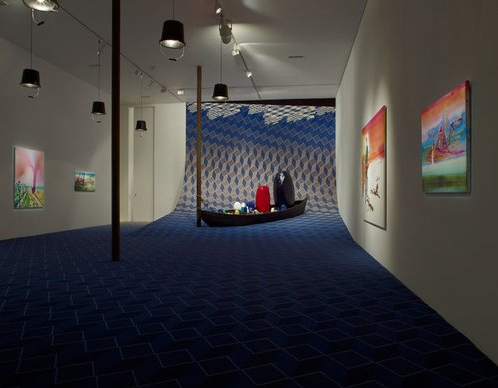John Kørner
London
John Kørner’s current exhibition Fallen Fruit from Frisland comprises a series of new paintings presented as part of an installation that features a carpeted floor, rising wave-like against one wall, and a simple wooden boat made by the artist’s great-grandfather.
The exhibition title refers to Frisia, a coastal area that extends across the Netherlands and Germany to the Danish border. Until the construction of canals during the 1920s and 1930s, this low-lying district, also known as Friesland, Fryslân and Frisland, was flooded for much of the year. In this mutable landscape locals made their farms on top of artificial hills, using boats to travel from field to field. It was here that Kørner’s great-grandfather plied his trade as a boat builder. Many decades later the artist discovered that a small wooden rowing boat made by his ancestor had been preserved in a museum.
Transported to London, the ancestral vessel functions as a poetic anchor point for paintings that ask us to consider our relationship to the ever-shifting rhythms, flows and tides of the natural world. On an initial viewing, Kørner’s new paintings appear to mark a departure from previous works, such as the fields of hazard yellow populated by abstract and figurative forms in 2006 ‚Problems‘, or ‚War Problems‘, the 2008 series in which Kørner addressed head-on the human cost of Denmark’s involvement in the ‚War on Terror‘ in Afghanistan.
Smaller in scale, and often deceptively simple in composition, these works seem to spring from a quieter tradition of landscape painting. Canals, trees, houses … it may seem as if these scenes were born in the sleepy ateliers of Northern Europe in the seventeenth century. Yet, in Kørner’s hands, landscape becomes an arena rich with transhistorical currents, almost hallucinatory with interminglings of the personal and philosophical.
Kørner’s work always encourages musings that can seem contradictory: on the one hand it is apparently open and easy-going, on the other it seems freighted with awkward questions about representation, knowledge, faith. The work speaks unquestionably to our own moment.



January 19 – March 2, 2013
16 Wharf Road
London N1 7RW
UK
Archive
- Dezember 2016 (1)
- Oktober 2016 (3)
- September 2016 (24)
- Juli 2016 (20)
- Juni 2016 (24)
- Mai 2016 (18)
- April 2016 (18)
- März 2016 (21)
- Februar 2016 (11)
- Januar 2016 (20)
- Dezember 2015 (20)
- November 2015 (37)
- Oktober 2015 (30)
- September 2015 (24)
- August 2015 (4)
- Juli 2015 (30)
- Juni 2015 (9)
- Mai 2015 (17)
- April 2015 (23)
- März 2015 (18)
- Januar 2015 (8)
- Dezember 2014 (1)
- November 2014 (3)
- Oktober 2014 (10)
- September 2014 (4)
- August 2014 (2)
- Juli 2014 (3)
- Juni 2014 (2)
- Mai 2014 (5)
- April 2014 (11)
- März 2014 (12)
- Februar 2014 (13)
- Januar 2014 (10)
- Dezember 2013 (5)
- November 2013 (13)
- Oktober 2013 (24)
- September 2013 (18)
- August 2013 (26)
- Juli 2013 (13)
- Juni 2013 (35)
- Mai 2013 (44)
- April 2013 (49)
- März 2013 (61)
- Februar 2013 (54)
- Januar 2013 (46)
- Dezember 2012 (50)
- November 2012 (58)
- Oktober 2012 (62)
- September 2012 (61)
- August 2012 (63)
- Juli 2012 (64)
- Juni 2012 (61)
- Mai 2012 (63)
- April 2012 (51)
- März 2012 (67)
- Februar 2012 (37)



